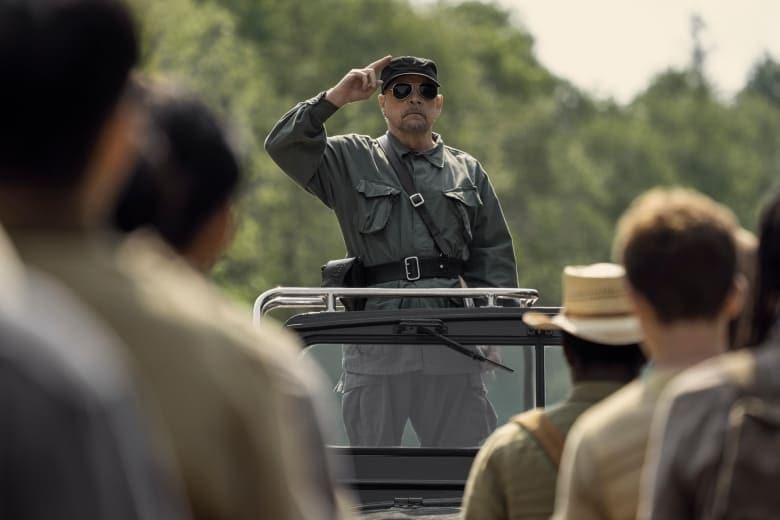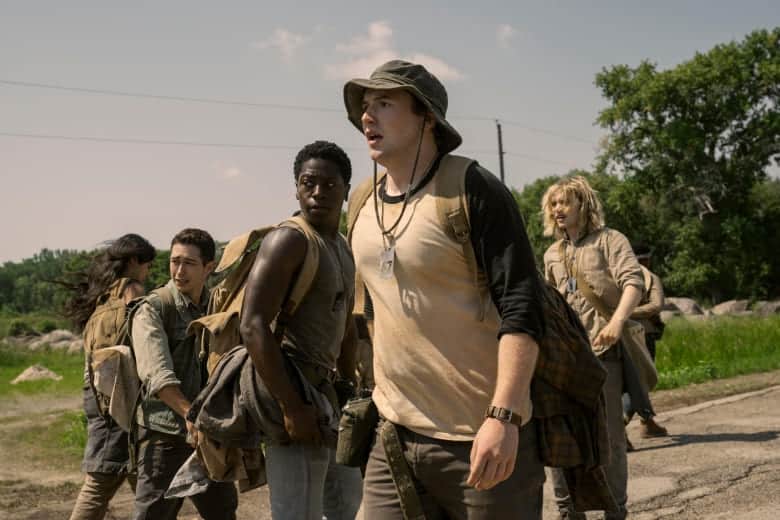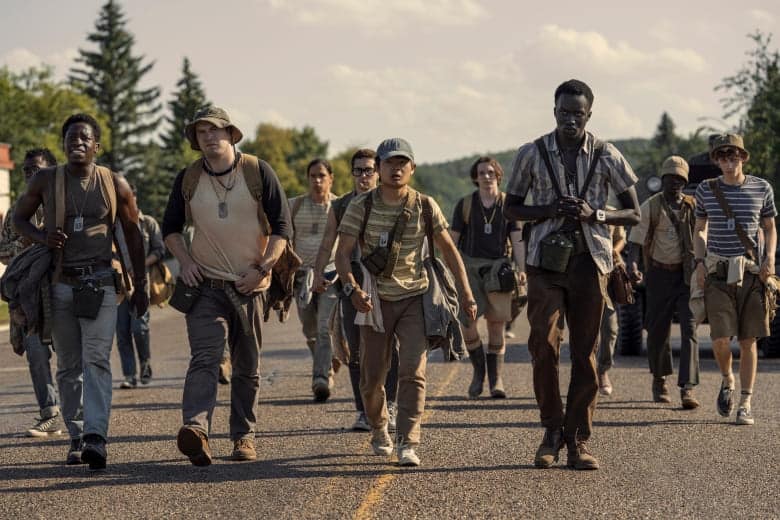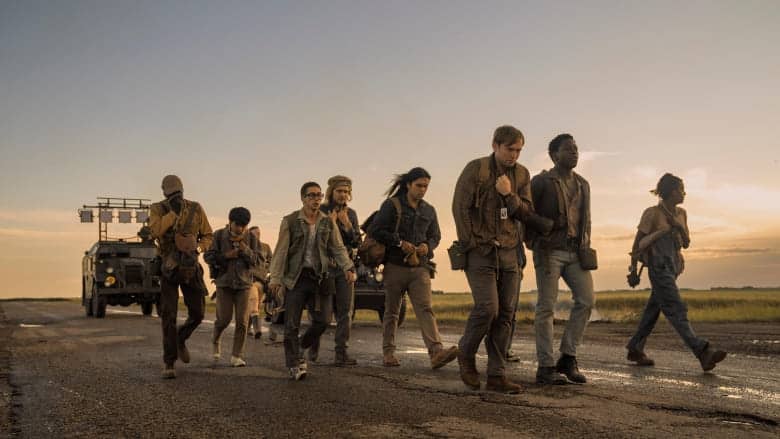The Long Walk (2025) Review: Francis Lawrence Breaks New Dystopian Ground
Stephen King, author of The Long Walk, and Francis Lawrence, director of its adaptation, are both established storytelling connoisseurs in the torture of teenagers. The very premise of The Long Walk reads like a hybrid of their most famous respective works. It’s the story of a group of adolescent boys forced by a fictional America’s ruling junta to suffer and die for national morale: The dystopian hellscape of The Hunger Games series meets the rancid-bellied vision of Americana depicted in something like It. The result is a far blunter parable of evil than either of these works, and this brutal simplicity proves to be both a great strength and ultimately a slight liability.
Quite Simply: A Long, Very Hard Walk

The rules and the narrative stakes of The Long Walk are established clearly and concisely in its first five minutes. Fifty boys have been selected from among thousands of volunteers across fascist-ruled America. Accompanied by a military escort led by a merciless, unnamed Major (Mark Hamill, who seems to have gargled with gravel for his scenes), they must walk along a road at a speed of no less than 3 miles per hour. Any boy who falls below this speed for any reason will be shot dead after three warnings. Once forty-nine boys have suffered this fate, the last one left will receive a lucrative financial reward and one grantable wish to spend.
A Grim Ordeal Stripped of All Frills
The Long Walk is an uncommonly raw and powerful watch precisely because it is a film that consists of little beyond this setup. For most of its 108-minute runtime, it’s hard to say that we’re even watching a narrative unfold. The sharply-drawn young characters are defined more through their dialogue than their actions, and The Long Walk‘s primary means of plot development is to kill off one boy after another.
This conceit is the most effective way to tell this story, because it forces us to experience the titular long walk as a uniquely unfiltered portrait of human death and suffering. The televised death-pageant of The Hunger Games was a searing allegory of our most sadistic onscreen diversions, but its elaborate spectacle and adherence to the hero’s-journey formula still recalled François Truffaut’s widely-echoed notion that there’s no such thing as anti-war cinema.

There’s no extravagance in The Long Walk. The characters and the audience alike experience it as a cheerless slog, and the plot, like the road that these boys must traverse, is surprisingly free of twists and turns. Lawrence and his screenwriter, JT Mollner, trust their audience enough to know that the film’s omnipresent tension needs no help from such devices.
In the same vein, cinematographer Jo Willems takes great advantage of the trek’s deceptively diverse scenery to sidestep the potential for visual monotony. The Long Walk’s sunrises and pastoral backgrounds have an innate beauty that merely enhances the story’s dreary grimness.
The Film Rides on Its Characters – And They Hold Up Admirably
Like all films following such a simple trajectory, The Long Walk’s momentum is largely dependent on the strength of its character portrayals. Its cast is uniformly excellent. In the lead role, Cooper Hoffman plays a boy whose backstory, goal, and core of basic decency make him a walking indictment of his world’s inhumanity. Judy Greer, as his agonized mother, conveys her emotional torment as palpably in her 3-odd minutes of screentime as any of the film’s major players do in nearly two hours.
David Jonsson, as the walker who quickly becomes Hoffman’s closest friend, strikes arguably the trickiest balance of any cast member, as his character espouses a fatalism that both keeps his spirit strong and encapsulates the weary hopelessness that permeates the film’s tone. Charlie Plummer provides the biggest surprise in the film, starting off as the kind of vile bully who could have been imported from a dozen other King stories, only to pivot once his malice has unintended deadly consequences.

The bond between Ray Garraty (Hoffman) and Peter McVries (Jonsson) is the film’s emotional center, and one of The Long Walk’s greatest strengths lies in how evenly it splits the difference between these two leads. Ray is the nominal hero and does plenty to earn the title, but Peter’s own backstory and his very different brand of fortitude make him more of a co-protagonist than a deuteragonist.
Indeed, the very setup of The Long Walk more or less guarantees both boys an equal place at the forefront of the narrative, just as the inherent immediacy of its violence lends the murders of even the most minor characters a disquieting resonance. And this shared focus on two heroes adds another dimension to the movie’s profound grimness: we become so attached to both characters that, barring some Hunger Games-esque climactic ploy, it’s effectively impossible for The Long Walk to have even a remotely happy ending.
About That Ending (No Spoilers)
Speaking of which, the brutally straightforward plot of The Long Walk leaves the film in quite a predicament when it comes to its dénouement. Very simply, the destination cannot match the immensely compelling journey.
Watching the film, one realizes that there’s only a handful of ways it could end, and none of them feel very satisfying: a) Ray and Peter threaten or go through with a suicide pact, compromising their oppressors’ control (whether this resulted in their deaths or their joint victory, it would make the movie a blatant rip-off of The Hunger Games). b) One of them nobly gives his life, leaving the other victorious but devastated (effective, perhaps, but still very predictable). c) Together, they lead their last surviving fellow walkers in a successful insurrection against their oppressors (under the circumstances, this would be so implausible as to destroy the movie’s grim, grounded tone).
Of course, I won’t divulge which of these endings we’re left with, but suffice it to say it’s an attempt at narrative subversion that, while committedly bleak, isn’t quite as unexpected as it’s supposed to be. It’s both a plot twist and a payoff, which doesn’t exactly fit the rawness of what comes before. The plotting in The Long Walk is so unusually grounded for most of its runtime that this ostensibly subversive conclusion ends up being its most conventional story point. It’s sufficiently cathartic. But after such an unrelenting ordeal, is that really what we’re looking for?






